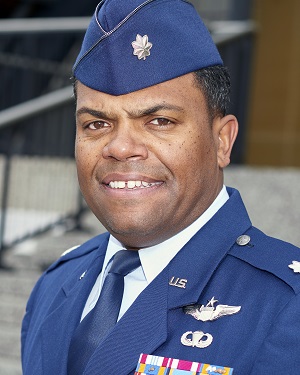Newsroom
Lt. Col. Harris talks leadership, community, more ahead of NAFCU's BOD conference
 Teamwork. Trust. Those are the foundational elements of a successful operation according to Lt. Col. Jason Harris. Harris is a decorated combat veteran, having served as a pilot in the U.S. Air Force, and is set to deliver the keynote at NAFCU's Virtual Board of Directors and Supervisory Committee Conference next week.
Teamwork. Trust. Those are the foundational elements of a successful operation according to Lt. Col. Jason Harris. Harris is a decorated combat veteran, having served as a pilot in the U.S. Air Force, and is set to deliver the keynote at NAFCU's Virtual Board of Directors and Supervisory Committee Conference next week.
Now a motivational speaker and certified character coach, Harris uses his life experiences to inspire teams and organizations to reach their full potential. His trademark: "No Fail Trust." This framework helps leaders establish the right training and processes to empower their people.
Ahead of next week's Board of Directors and Supervisory Committee Conference – sponsored by Gallagher – Harris provided NAFCU with some insights into leadership, serving the community, hiring the right people, and more:
Q: What was the most resonating lesson you took away from your time in the U.S. Air Force?
A: The Air Force taught me so many things and it's hard to narrow it down to one top resonating lesson. That said, I will do my best to answer the question as succinct as possible and narrow it down to one thing. TEAMWORK. I don't have to be the smartest person in the room. I don't have to be the most experienced person in the room. I don't have to be the most skilled person in the room or on the team. I must be COMMITTED to the team, along with my inputs, no matter how big or small, that will help to dictate the outcome. If we all show up with a heart, mind and commitment to TEAMWORK, failure becomes less likely and success is our continued outcome.
Q: What advice do you have for people looking to have a bigger impact on their communities?
A: Impact on our communities comes in many different ways. It can manifest by our giving of our time, our talents and our commitment to the community. I would always start with ensuring that we are committed to our community by first showing up. Once we show up, we must hear, understand and acknowledge the people in our communities. Once that happens, we then have built a foundation of mutual trust that allows us to start making an impact. Sometimes, just being heard, understood and acknowledged will have such a profound effect on people that it can literally change entire communities. Don't believe it? Ask someone that feels marginalized what they really want. You will find that what they really want is those three things. That validates their humanity. And when you validate their humanity, they will begin to operate in their purpose accompanied by passion and commitment.
Q: What qualities should credit union leaders and boards look for in employees to build strong, effective teams?
A: Let's remember that we can teach skills, we can't teach personality and what are considered "soft" skills. If someone doesn't know how to run a 10-key very well, we can allow them to practice and get good at that skill. We can teach many other skillsets that are part of the job requirements. We can't teach someone how to treat our members. Our members are precious, for many reasons, and of course they are the reason we exist. I want to look to hire someone that has a heart for people. Someone that is a team player. Someone that exudes they will be a committed member of the team that we already have in place.
If I am hiring someone to be in a management/leadership role, I need someone that is ready to be a coach, mentor and leader, not someone ready to bark orders and force a compliance culture over a commitment culture. A coach will bring out the best in their people by capitalizing on their innate talent, skills and ability.
Q: How should leaders think about strategy and put plans into action?
A: Strategy has to be thought about in a holistic manner. As Simon Sinek says, "start with why, and start with the end in mind." What is the outcome you want for your organization, team and individuals? This will then drive the strategy, how and who implements that strategy and the action(s) necessary to make it happen.
Additionally, when we think about strategy as leaders, oftentimes we don't include the people that execute our strategy. The strategy falls flat and seems to go nowhere. When the team members that are responsible for executing strategy feel like they are part of creating the strategy they will be committed to ensuring the strategy is executed. Those team members will be committed to the team, the organization, the leaders and the strategy. They will feel empowered as they will feel heard, understood and acknowledged.
Q: What message do you hope people who hear you speak take away?
A: I want people to recognize that everyone in an organization has a part to play, from the frontline team members to the CEO, President and Board Members. I want people to recognize and appreciate that a title is not needed to make a difference in an organization. This is the essence of No Fail Trust.
Interested in learning more about Lt. Col. Harris ahead of next week's conference? Check out his website and YouTube channel.
Share This
Related Resources
NCUA Letter to Credit Unions Addresses Cyber Incident Notification Requirements
Operations Board and Governance
Blog Post
Money Talks: Gift Giving to Officials
Board and Governance
Blog Post
Get daily updates.
Subscribe to NAFCU today.
